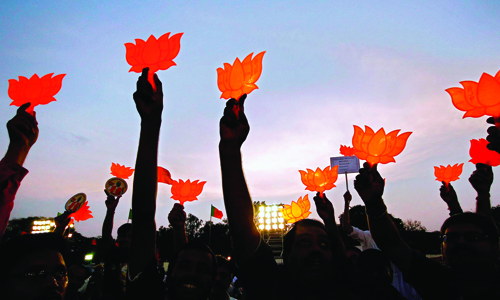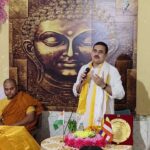Scaling greater heights
- By : Anirban Ganguly
- Category : Articles

On April 6, the BJP completed 37 years of its founding. 37 years of ceaseless sustenance and progression for an intellectual and political movement is indeed striking and in its 34th year, in 2014, when the BJP reached its peak, it demonstrated that it had entered its phase of robust youthfulness which would see the party expand, deepen its roots and evolve into a greater structure of the masses. In the last few months and years, BJP’s reach has percolated across the spectrum, it has widened its reach and acceptance, it has touched those who were seen to be beyond the pale of its vision for India and has succeeded in enlisting them in the march for India’s integral transformation. Read This – Say no to plastics! One of the hallmarks of a robust political movement is its ability to generate an uplifting narrative which eventually finds wide acceptance and adherence. The other is its capacity to work out that narrative. While most other parties are struggling to evolve or re-articulate their respective narratives, one needs to see the example of how the Congress and the exhausted and fast dwindling species of Indian communist parties have lost the ability of political articulation and narrative creation, but the BJP has been able to successfully to do both over the years, especially in the last three years. The articulation of a “New India” is its most appealing narrative, a narrative which seeks space and is gaining acceptance and will eventually propel India towards the future. Read This – Reinvent India’s trade pattern From being only a cadre based party of the Jana Sangh days, the BJP evolved into both – a cadre based and guided mass party. Few political conglomerations have been able to replicate this feat in such a short time. Indeed, the last few years have seen the party’s phenomenal expansion and growth and more importantly has seen it re-state a philosophy of governance, of politics and also a reiteration of its ideological core, which, because the party derives its strength from a long and upholding ideological flow, keeps evolving and re-formulating itself. In the last two years or so the party has seen a phenomenal expansion of its activities and reach. It is again a sign of health when a political party can ideate and work out a creative and constructive programme of cadre training, worker mobilisation, ideological orientation and societal outreach. The BJP under its president Amit Shah has continuously done all of these. It has gone beyond being a mere election-fighting machine or a party that came alive only during elections. The systematic training of newly inducted party workers and a sort of refresher for those who have been with the party for years is an exercise that is worth examining. No other political party in recent memory has undertaken such a vast and intricate exercise in order to ensure that the ideological core remains well-watered. It is these constant seeding that makes a political party a self-renewing entity and pushes it beyond conventionality. This is the BJP’s strength, while other parties have remained predominantly beholden to dynasties, families and foreign ideologues; the Jana Sangh and the BJP have always based their political praxis on distinct indigenous political thinking and theory. In evolving that theory BJS and BJP’s political thinkers assiduously and copiously read and examined political philosophies of the world but they were always conscious and convinced that the political praxis for India had to be inspired and driven by her indigenous civilisational and political ethos and world-view. The party’s first convention held in Mumbai between December 28 and 30, 1980, saw a legion of leaders, trained in the Jana Sangh mould directly under Pandit Deendayal Upadhyaya pledge to work towards a new alternative for India. The formidable M.C.Chagla, Nehru’s Education Minister and Indira’s Foreign Minister, present at the convention later wrote in a piece that appeared in a leading national daily, a few weeks before his death, that “there is just a glimmer of hope which is beginning to show itself and that is the extraordinary strength which this new party, the Bharatiya Janata Party, has shown…And if this party goes on from strength to strength and receives the support of people all over the country we might at last have a democratic alternative to Indira’s government.” A veteran journalist observing the convention made a very perceptive point when he wrote that “one aspect of the convention has, however, gone virtually unnoticed: its being relatively free from any obsession with Mrs. Gandhi and what she might or might not do – the kind of obsession that had been oppressively present at practically all conferences of Opposition Parties in recent years. The BJP convention was, unlike them no gathering of frightened men. There was, on the contrary, a quiet but palpable self-confidence. This seemed significant. It certainly made for constructive deliberations.” This is what set the new experiment apart from the rest and which has seen it through all these years. A major peak has now been reached and its time for scaling greater heights. As BJP president Amit Shah once reminded the workers of the party’s departments, “we have reached a peak but it is not for plunging downward but to leap towards greater heights.” In its 37th year, BJP is firmly poised for that next leap.

















